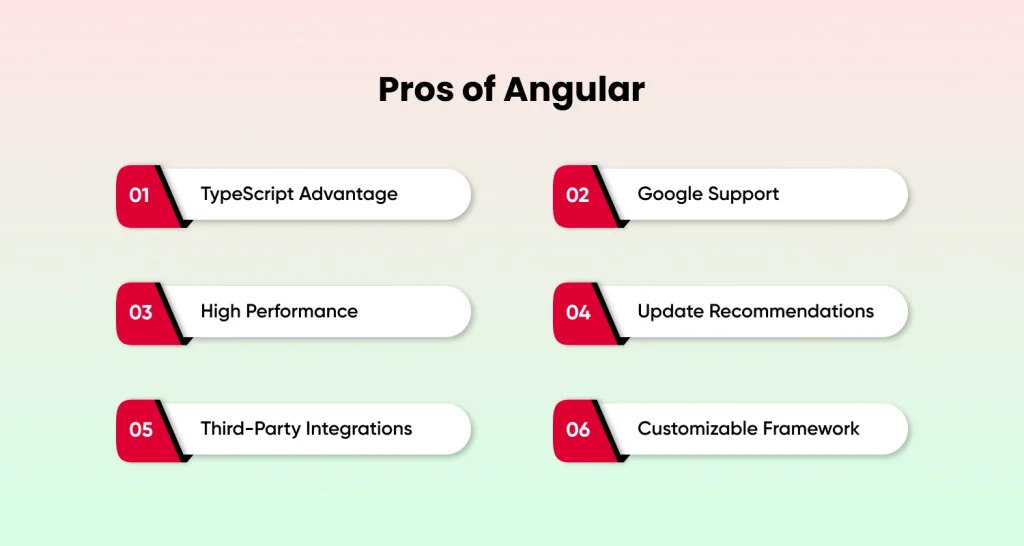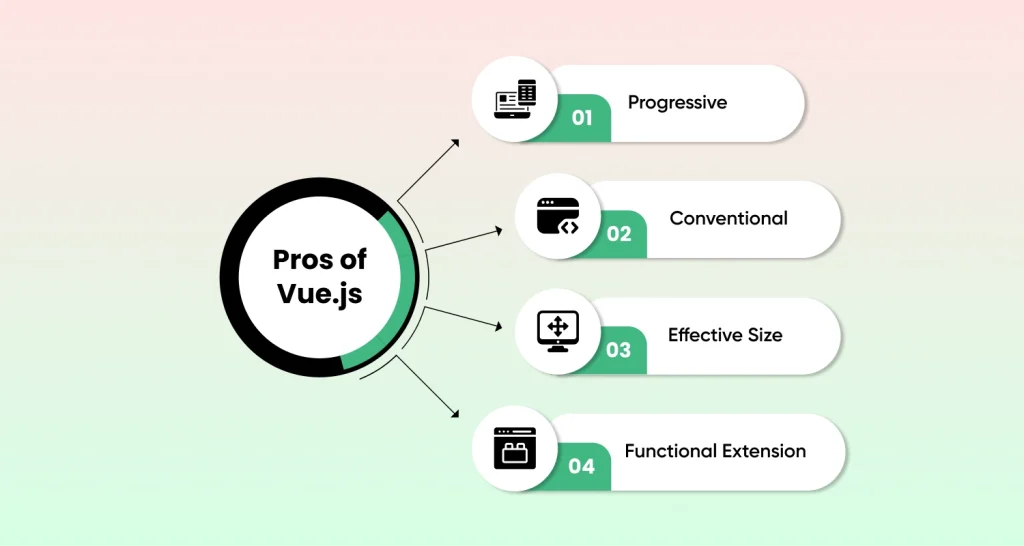In 2006, JavaScript released jQuery, its library to allow developers to build interactive web apps and since then, the industry has seen the evolution of several JavaScript frameworks. As these keep coming to the forefront quickly, the development of organized frontend frameworks has also been on the rise. Out of the multiple JavaScript frameworks available, the two most notable ones are – Angular and Vue. With the ongoing and heated Angular vs Vue debate, it is often difficult for businesses to choose one.
But, you need not worry because we are here with this comprehensive guide that talks about both of these frameworks in detail. We will not only discuss these frameworks in brief but also compare both of them based on a lot of factors. By the end of this article, you will have learned about the key points and prime features of both Angular and Vue. So, what are you waiting for? Jump right into it and get started with knowing more about Angular and Vue for your development needs.
Angular Vs Vue – Overview Of Frameworks
Before we dive any deeper into this Vue vs. Angular debate, let us have a look at both of these frameworks. The following subsections will provide an overview of Angular and Vue to help you understand why they are popular and highly preferred by developers.
What Is Angular?
Angular is a JavaScript framework that is based on TypeScript and allows businesses to easily build scalable business applications. It is a front-end framework that is standalone and comes with built-in tools and libraries which have no impact on the size and speed of the developed application. Since Angular allows developers to reuse code, the framework offers developers with a lot of opportunities across different platforms. Angular also has a dynamic UI binding at the plain object or property level and allows two-way data binding too.
What Is Vue?
Vue is said to be a lightweight and flexible framework that is based on JavaScript and provides developers with advanced web tools that help them build front-end web apps and modernized SPAs. Vue is also considered to be a flexible, versatile, and progressive JavaScript framework that allows developers to change creation in any application code while ensuring that it does not affect any core feature built. This means that developers have the opportunity to produce applications with progressive UI and advanced functionalities.
Angular Vs Vue – Market Usage Statistics
Now that you have a brief framework about both sides of the Angular vs Vue debate, let us talk about their market statistics. Here, we will talk about the differences in the Vue vs. Angular popularity and other usage statistics that will help you understand their market potential.
Angular Usage Statistics
Some Angular usage statistics that you must keep in mind include:-
- Angular is used by over 0.4% of all websites using JavaScript libraries and frameworks
- Although Angular is used by a few websites, it is primarily used by sites with high-traffic
- As of September 2023, Angular has 90.5K stars, 24.3K forks, over 1700 contributors, and a repo of over 3.1 million users on GitHub
Vue Usage Statistics
Some Vue usage statistics that you must keep in mind to take a stance in the Angular vs Vue debate include:-
- As of September 2023, over 1,680,000 live websites across the globe use Vue
- Approximately 94.3% of websites using Vue prefer Vue 2 and the technology has a market share of more than 0.8%
- The Vue community on GitHub has 205K stars, 34.4K forks, and over 350 contributors

Angular Vs Vue – Tabular Comparison
Before we dive into the critical Angular vs Vue differences, let us have a look at a tabular comparison.
| Basis Of Comparison | Angular | Vue |
| Known as | Full-featured JavaScript framework | Progressive JavaScript Framework |
| Source Language | Typescript | JavaScript and also supports Typescript |
| Size | 563 kB (minified and compressed) | 33.5 kB (minified and zipped) |
| Performance | Fast | Comparatively Faster |
| GitHub Stars | More | Comparatively Lesser |
| Learning Curve | Steep | Comparatively Easier |
| Browser Rendering | Shadow DOM | Virtual DOM |
| Error Handling | Compile time | Run-time |
| Community | More popular than Vue | Comparatively Smaller |
| Developer and Author | Evan You | |
| License | MIT | MIT |
Angular Vs Vue – Pros And Cons
Now that we know about the main points in the Angular vs Vue debate, let us look at the pros and cons of both frameworks. This will help you understand the prime difference between Angular and Vue JS in no time.
Angular – Pros

- TypeScript Advantage – Since Typescript is considered the superset of JavaScript, it provides developers with superior navigation, refactoring services, and autocomplete features that help eliminate errors within code. So, the development of enterprise-grade apps in Angular is easier and helps reduce the overall development time.
- Google Support – Angular was released by the Google team which is why developers get long-term support and can refer to detailed documentation and guides. So, the framework offers unlimited development possibilities which is why most businesses look for the top angular development company.
- High Performance – Since Angular utilizes hierarchical dependency injection, Ivy renderer, AOT compiler, and Angular Universal support, high performance is guaranteed.
- Update Recommendations – With the Angular CLI, developers can get regular recommendations and updates that help speed up the development process.
- Third-Party Integrations – Angular developers can easily integrate with third-party applications to get access to increased flexibility and expert tools for better development progress.
- Customizable Framework – Based on the requirements and needs of developers, elements and modules from other modules can be easily integrated.
Angular – Cons
- Complexity – Although Angular has a component-based architecture, managing all components and its repetitiveness make the front-end framework verbose for its developers.
- Angular versions – Migrating from AngularJS to Angular can be really difficult especially since the framework application is quite vast.
- Heavily weighted framework – Since Angular requires boilerplate codes, abstractions, and other bundled features to be included, simple and small applications can also become quite heavy in size.
Vue – Pros

Now that we have discussed Angular, let us talk about the pros and cons of the Vue framework. This section will help you understand the key differences and help compare the Angular vs. Vue performance.
- Progressive – Migrating to Vue can be easily done by gradually introducing it to the existing code while other components are under development. This means that development time is not wasted on migration and the team can focus on designing and developing critical features.
- Conventional – Vue adopts conventional coding practices that do not make writing boilerplate code more difficult. Ultimately, this helps cut down on the overall efforts required and the time needed to develop a functional app.
- Effective Size – As Vue keeps on releasing newer versions, the framework keeps getting lighter and faster. Since Vue offers developers with optimization ability, they can focus more on adding features to their applications instead of debugging and modifying the code.
- Functional Extension – With Vue’s large set of additional API tools available, developers can utilize these function-based tools and easily compose component logic in applications making them more flexible and extensive. This in turn makes applications more readable and allows developers to extend the functions based on business needs.
Vue – Cons
- Community – Vue has a global community that is majorly concentrated in China which causes a lack of language understandability in the global community.
- Code Reactivity – Although Vue’s two-way data binding feature comes in handy in the creation and sync of components across an application, data chunks are rendered or parts of features are triggered by the DOM.
- Support – Since Vue has a smaller community as compared to Angular, it is considered to be a young framework.
- Flexibility Risk – It is always great when customization and flexibility options are available, but the problem with Vue is that it offers too much flexibility. This can overcomplicate the project and lead to a lot of errors and code irregularities.
- Resource Limitations – Although Vue has a wide ecosystem, it is still difficult to find plugins and tools that are easily compatible with the available external tool sources and frameworks.
Angular Vs Vue – Use Cases
Now that we know about the differences in both the frameworks, it is necessary to discuss the use cases of both of these frameworks. After all, you must know when to hire Vue.JS developers and when you must hire Angular developers.
Angular Use Cases
- Applications that stream videos
- eCommerce platforms
- Applications utilizing real-time data
- Portals dealing with user-generated content
- Websites based on content
- Progressive web applications (PWAs)
- Native mobile applications
- Single-page web applications
- Gaming applications
- Applications that utilize cloud technologies
Vue Use Cases
- PWAs
- Single-page applications
- Small projects and applications
- Large-scale enterprise solutions
- Extension of existing application design
- Extension of existing app functionalities
We hope the above sections helped you get a clear idea about the scenarios in which you should prefer VueJS development services and those in which Angular is more favorable.
Conclusion
Both Angular and Vue have their pros and cons which is why it is necessary you evaluate these based on your project needs. We hope the above article helped shed light on both of these frameworks and helped you decide on one.
If you have zero coding experience or are looking for expert help, we recommend getting in touch with a professional development company. Hire Dedicated Angular Developers or Vue experts and outsource your development team to ensure you get access to the top global talent.
Frequently Asked Questions
Why Is Vue Better Than Angular?
Vue is better in terms of offering developers with a wide range of in-app templates that help cut down the total development cost and time. Moreover, it is easy to integrate applications based on Angular or React into the Vue platform.
Is Angular Better Than Vue.js?
Both Angular and Vue have different benefits and drawbacks which is why you must choose one based on project needs. Check out the above article to learn more and compare the features of these popular frameworks.
Vue vs Angular: Which Is Better for Small Projects vs. Large-Scale Applications?
Vue is not scalable which is why it is undoubtedly better for small projects. Whereas, Angular allows developers to reuse code on multiple platforms and offers high scalability making it perfect for the development of large-scale applications.
Are There Any Notable Companies or Projects Using Angular or Vue.js?
Some popular projects developed by Angular include Google, Gmail, Forbes, PayPal, and UpWork. And, some popular applications built by Vue include Laravel Spark, Gitlab, Font Awesome, Grammarly, and Behance.







